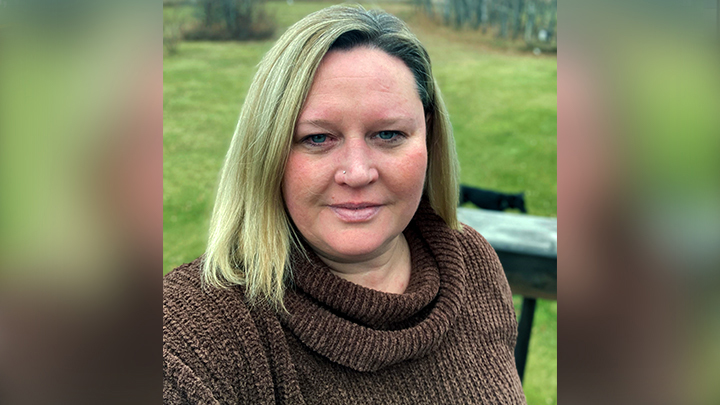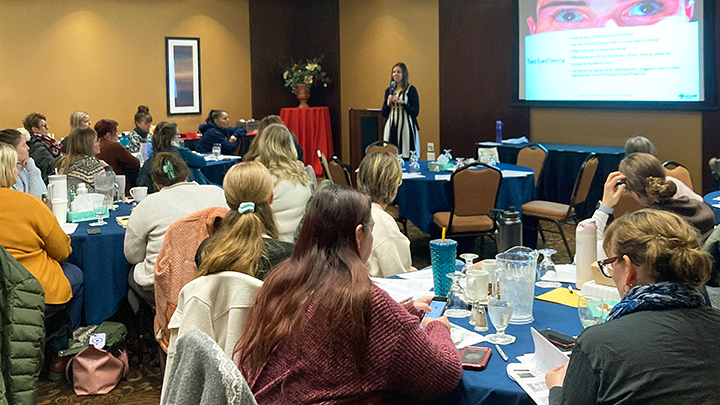
March 25, 2025

Amy Regnier, a nurse practitioner with the AHS North Zone Palliative Care Team, is leading the work to improve palliative care for Cold Lake First Nations. “Improving access to palliative care ensures that all individuals — regardless of their circumstances or where they live — receive compassionate, culturally appropriate support and dignity at the end of life.” Supplied.

Michelle Agopsowicz, a family counsellor with the Grief Support Program at the AHS Richmond Road Diagnostic Treatment Centre, speaks during one of the 2024 engagement sessions. Supplied.
Story by Lisa Laferriere
Improved access to palliative care for Cold Lake First Nations is the goal of a project now being led by the North Zone Palliative Care Team of Alberta Health Services (AHS).
In 2023, the team identified that the ability to provide home deaths in this Indigenous community is limited, but desired. They then approached Cold Lake First Nations to do a root-cause analysis and debriefing around the Nation’s ability to support home deaths. Thanks to this meeting, gaps were identified.
In response, the team applied for a grant through Health Excellence Canada, and were awarded $50,000 for two years, for a total of $100,000. This funding is being used to improve equity and access to palliative care services in the community.
“Improving access to palliative care ensures that all individuals — regardless of their circumstances or where they live — receive compassionate, culturally appropriate support and dignity at the end of life,” says Amy Regnier, a nurse practitioner with the AHS North Zone Palliative Care Team.
Regnier is leading the project, along with other members of the North Zone Palliative Care Team. This multidisciplinary group also includes a respiratory therapist, palliative care resource nurses, mental health therapists, recreational therapists, occupational therapists and social workers.
Regnier and two nurses from the AHS North Zone palliative care team met with Cold Lake First Nations to further identify the issues that are preventing residents of Cold Lake First Nations accessing palliative care in their home community.
They discovered that the community often struggles to access nearby AHS and Covenant Health services, including the Cold Lake Healthcare Centre and Bonnyville Healthcare Centre, which operate under a different system than what they have available on the reserve. They also identified the need to improve cultural understanding and palliative care education at these surrounding sites.
“Many residents expressed a desire to pass away at home, but face challenges in accessing necessary resources,” says Regnier.
To help address these gaps, the Palliative Care Team has held two of four planned engagement sessions. The first, in September 2024, focused on storytelling and reconciliation. The second, in November 2024, centred on trauma-informed palliative care. Each session attracted 45 in-person attendees and 30 virtual attendees, drawing participants from AHS, Covenant Health and Cold Lake First Nations.
“Feedback has been overwhelmingly positive, and these sessions are helping bridge the gap between Cold Lake First Nations and external services,” adds Regnier. “Cold Lake First Nations is now discussing palliative care as a real option — not just a wish.”
Two more sessions are planned for this year to further strengthen relationships and address any remaining gaps in services.
“These sessions have sparked important conversations between the Nation and AHS,” says Lillian Turzanski, nursing manager/community health nurse with Health Services at Cold Lake First Nations. “Our conversations seek to shed light on the struggles faced by Cold Lake First Nations families, particularly given the historical absence of home-based palliative care.
“We believe that this initiative can reinforce the bond between the Nation and the province, encourage shared learning, improve experiences for both caregivers and patients, and ultimately lead to more successful palliative care within the community.”
Upon project completion with Cold Lake First Nations, the team sees potential to apply what they’ve learned across the North Zone. The project will wrap up in March 2026, with a final report and an impact video planned to share their results.
“It’s been a fulfilling experience,” says Regnier. “We’ve gathered valuable insights and will see real results.”
For more information, contact Amy Regnier at Amy.Regnier@ahs.ca.